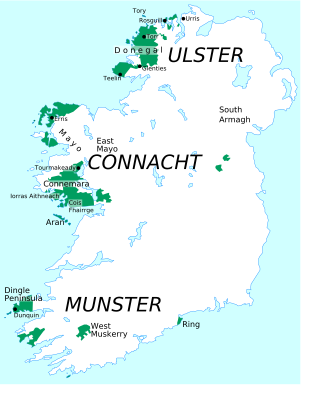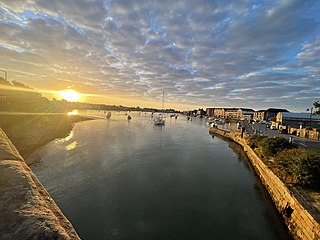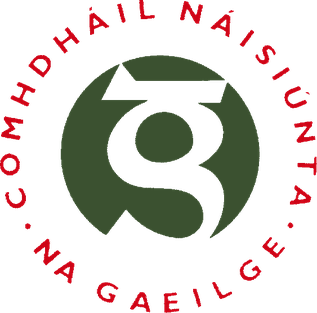Related Research Articles

A Gaeltacht is a district of Ireland, either individually or collectively, where the Irish government recognises that the Irish language is the predominant vernacular, or language of the home. The Gaeltacht districts were first officially recognised during the 1920s in the early years of the Irish Free State, following the Gaelic revival, as part of a government policy aimed at restoring the Irish language.

The University of Galway is a public research university located in the city of Galway, Ireland.

Éamon Ó Cuív is an Irish Fianna Fáil politician who has been a Teachta Dála (TD) for the Galway West constituency since the 1992 general election. He previously served as Deputy leader of Fianna Fáil from 2011 to 2012, as Minister for Social Protection from 2010 to 2011, Minister for Community, Rural and Gaeltacht Affairs from 2002 to 2010, and as a Minister of State from 1997 to 2002. He also served as Minister for the Environment, Community and Local Government and Minister for Defence from January to March 2011, appointed to these positions in addition to his own on the resignation of other members of the government.

Dungarvan is a coastal town and harbour in County Waterford, on the south-east coast of Ireland. Prior to the merger of Waterford County Council with Waterford City Council in 2014, Dungarvan was the county town and administrative centre of County Waterford. Waterford City and County Council retains administrative offices in the town. The town is in a townland and civil parish of the same name.
Gaelcholáiste Reachrann is an Irish-speaking secondary school, located in Donaghmede, Dublin in Ireland. The school is under the patronage of the Dublin and Dún Laoghaire Education and Training Board. Reachrann shares a premises with Grange Community College. In the 2020/21 school year, Gaelcholáiste Reachrann (GCR) had an enrollment of 499 students. The school was ranked 1st in its area by the Irish Times in the 2019 Good Schools Guide.

The North American Gaeltacht is a gathering place for Irish speakers in the community of Tamworth, Ontario, in Canada. The nearest main township is Erinsville, Ontario. Unlike in Ireland, where the term "Gaeltacht" refers to an area where Irish is the traditional language, this part of Ontario has no resident native Irish speakers. The name refers instead to its being a meeting place for Irish speakers from North America and elsewhere.

An Cumann Gaelach is the Irish Language Society at Queen's University Belfast. Established in 1906, it is the third oldest society still in existence at the University, after the BMSA and Christian Union. The first meeting of the society was held on 30 January 1906, with William Mac Arthur being elected the first president. The society is part funded by the University, through the QUB Students' Union.
An Cumann Gaelach is a type of student society found in many colleges and universities in Ireland. Several of these societies were founded in the early 1900s as part of a wider revival of the Irish-language, which saw the establishment of national groups such as Conradh na Gaeilge. Although the societies are not formally linked, they operate in a similar manner through the facilitating of Irish classes, céilís and trips to the Gaeltacht, while many hold events in March during Seachtain na Gaeilge. Some societies also take part in the annual Glór na nGael competition, which gives awards to third level groups for their work in the promotion of the Irish language. Coordinated by Foras na Gaeilge, the competition includes a specific category for colleges and universities. The University of Glasgow's Cumann Gaelach Ollscoil Ghlaschú was founded in 2016.
Brian Ó Cuív was a Celtic scholar who specialised in Irish history and philology.
A Neo-Gaeltacht is an area where Irish has a strong presence as a spoken language but is not part of the officially defined or traditional Gaeltacht areas. It has been argued that non-Gaeltacht activist groups wishing to establish an Irish language community need to show that it is large, permanent and formally organised and that it has a growing number of people using Irish as their first language. Another objective is a situation in which children use Irish among themselves and with other Irish speakers in a natural way while being able to deal with a largely English-speaking world.

Comhdháil Náisiúnta na Gaeilge (CNnaG) was the central steering council for a number of organisations involved in the promotion of the Irish language. Its mission was to "strengthen and consolidate goodwill and support for the Irish language and its usage as a living language so that it may be used freely and widely in all aspects of Irish life".
The Irish language originated in Ireland and has historically been the dominant language of the Irish people. They took it with them to a number of other countries, and in Scotland and the Isle of Man it gave rise to Scottish Gaelic and Manx, respectively.
The Rev. Canon Cosslett Quin, in Irish Cosslett Ó Cuinn was a priest of the Church of Ireland who translated the New Testament into Irish.
Translations of the Bible into Irish were first printed and published in the 17th century: the New Testament, the Tiomna Nuadh, in 1602, the Old Testament, the Sean Thiomna, in 1685, and the entire Bible, the Biobla in 1690.
Glór na nGael is an Irish-language lead organisation funded by Foras na Gaeilge which promotes and supports Irish in three sectors: the family, community development, and business. It was established as an Irish language community group competition in 1961, and Cardinal Tomás Ó Fiaich and Monsignor Pádraig Ó Fiannachta were among its founders.
The Society for the Preservation of the Irish Language was a cultural organisation in late 19th-century Ireland, which was part of the Gaelic revival of the period.

Coláiste na hÉireann is a third-level college in Dublin, Ireland offering qualifications in the study of translation and the Irish language.
Risteárd Ó Glaisne was a Methodist Irish language activist, teacher and writer.
References
- ↑ Lá Nua: "'Glúin TG4' ag teacht in aibíocht ar champais ollscoile na hÉireann"; Monday 10 December 2007
- ↑ "senior cycle". skoool.ie. Archived from the original on 16 November 2013. Retrieved 9 November 2013.
- ↑ "Douglas Hyde (1860-1949). The Trinity Connection. Quatercentenary Discourse: Pavilion, College Park, Trinity College Dublin" (PDF). tcd.ie.
- ↑ "Cumann Gaelach - Central Societies Committee - Trinity College". Trinitysocieties.ie. Archived from the original on 19 December 2013. Retrieved 9 November 2013.
- ↑ "The latest news from Cogar". Cogar.ie. Archived from the original on 16 November 2013. Retrieved 9 November 2013.
- ↑ "Cumann Gaelach". ISSUU. Retrieved 9 November 2013.
- ↑ "Smedias 2013- Society Publication of the Year". Oxygen.ie. Archived from the original on 22 August 2013. Retrieved 9 November 2013.
- ↑ Sibéal Davitt. "Glór na nGael's Third level Competition Shortlist announced". Gaelport.com. Archived from the original on 25 May 2013. Retrieved 9 November 2013.
- ↑ "Duaiseanna Ghlór na nGael 2012 Bronnta". An Tuairisceoir. Retrieved 9 November 2013.
- ↑ Clár Johnston. "Duaiseanna Ghlór na nGael 2013 bronnta". Gaelport.com. Archived from the original on 26 June 2013. Retrieved 9 November 2013.
- ↑ "Seomra na Gaeilge Officialy[sic] Opened". The University Times. 4 October 2012. Retrieved 9 November 2013.
- ↑ "Irish Press Releases » Minister Éamon Ó Cuív Launches Trinity College Dublin's Irish Language Scheme Seolann An tAire Éamon Ó Cuív Scéim Teanga Choláiste na Tríonóide, Baile Átha Cliath". Irishpressreleases.ie. 11 February 2010. Archived from the original on 23 March 2010. Retrieved 9 November 2013.

